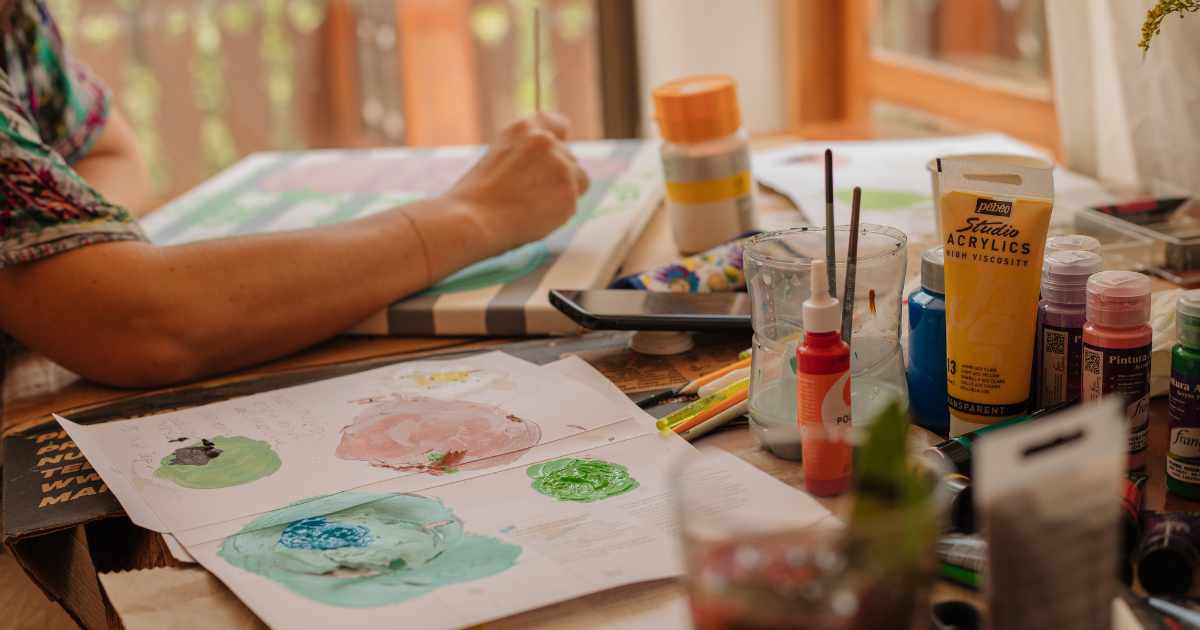CASEM Co-op: An Empowerment Model
La Cooperativa de Artesanas de Santa Elena y Monteverde, more commonly known as CASEM, has been providing its customers with locally produced, handmade crafts including clothing, bags, jewelry, artwork, toys and more for 32 years, and it does so using a cooperative model that directly benefits the artisans that create them. The store itself contains an area in the front for the women’s crafts, a back area for non-local souvenirs, a workshop, a gallery and a restaurant.



Doña Nery Gómez displays some of the work of the members of CASEM at the reception desk.
CASEM Co-op is much more than just another souvenir shop.
From my first contact with the manager, Doña Nery Gómez, I was welcomed to CASEM with kindness and enthusiasm, something I don’t always get when asking for interviews for stories.
I walked down the hill from Hotel Belmar to CASEM on a bright and sunny morning. As I came up the street I saw the large, colorful building with the sign proudly displaying “CASEM COOP” sitting on top. As I walked in, I could hear the chatter of volunteers drinking coffee in the shop’s restaurant as customers perused the shelves looking at the handiwork of the members of the co-op.
La Cooperativa de Artesanas de Santa Elena y Monteverde, more commonly known as CASEM, has been providing its customers with locally produced, handmade crafts including clothing, bags, jewelry, artwork, toys and more for 32 years, and it does so using a cooperative model that directly benefits the artisans that create them. The store itself contains an area in the front for the women’s crafts, a back area for non-local souvenirs, a workshop, a gallery and a restaurant.
In addition to selling unique souvenirs and crafts, CASEM has been critical in the empowerment of women in Monteverde and the surrounding communities, who make up the majority of the co-op. Through training programs, greater economic freedom and a supportive community, CASEM has helped many women to develop personally as well as financially.
“CASEM has been a great tool in the community in accomplishing women’s development,” Nery says as we sit in the workshop upstairs. “It has helped many at-risk women to do personal projects that they couldn’t do before. They have realized the value that each woman has through this organization.”

Wooden spoons made by the artisans of CASEM.
Once part of the Cooperativa Santa Elena, CASEM was established in 1982 by eight women, including founder Patricia Jiménez. In 1987, the Cooperativa Santa Elena donated land for the new CASEM building, which still stands today. Now, after 32 years in business, CASEM has grown to 88 members – 85 women and three men.
“It has been an enormous transformation, as much in the economic part, which helps the women economically, as in the personal development of each woman,” Nery says. “We don’t have those fears that we had before anymore. There’s still a little bit of uncertainty, but not as much as before. I want to keep achieving these things.”
The cooperative system allows each artisan to work from home or from the workshop, creating products that are then sold in the store at a price that the artisan chooses. The artisans use 25 percent of the money earned for administrative costs and 10 percent for “social capital,” which is saved over time and given to the artisan when she leaves the co-op. The remaining 65 percent of the earnings are split evenly among the co-op members.
“This is the difference between us and any other business, that the earnings always belong to our own members,” Nery says. “Nobody makes more. Nobody gets rich here.”
This system is a welcome relief for those looking to make a positive impact on the local community. Not only do customers get a unique, handmade product rather than one mass-produced in China, but they also directly contribute to the livelihoods of the people who make them. There are no long assembly lines here – no terrible working conditions or dismal wages. Here, everyone works on her own terms, sets her own prices and is her own boss.
Luz Mery Cambronero is a member of CASEM who embroiders products to sell in the co-op. She works from home in order to take care of her mother while also contributing financially to the household. “I like (CASEM) a lot because I feel like it is a really good way to help, especially for housewives that aren’t able to work,” she says.
CASEM offers educational programs and training that help the members of the co-op improve their skills in business and other areas. These programs are done through the National Institute of Learning or through training within the co-op itself.
“We try to keep it in our heads that training should be permanent, that we always have to be thinking of what we can do to get better, that maybe what we’re doing is a little bit obsolete, discovering more things, more techniques…” Nery says.

The receptionist at CASEM displays some of the women’s products.
Additionally, CASEM regularly receives support from a program called Global Volunteers, a non-profit organization that offers “volunteer vacations” in 17 countries worldwide. Since 1999, volunteers have come to CASEM for one or two week periods to assist with everything from painting the building to reorganizing the store.
Sally Nist volunteered at CASEM through Global Volunteers with her granddaughter in June. I arrived the day before the volunteers left, and I could tell that everyone was sad to see the experience ending.
“It has been great, just so wonderful,” Sally says. “Especially for my granddaughter, who’s 16. I think it’s important for young people to be exposed to serving and helping others, so this is the perfect project. I have had such a good time.”
Sally, who many of the women affectionately call “fuerte abuela,” or “strong grandma,” says she has learned a lot from working at CASEM. One thing she has learned is the importance of the project for the families of the women and men that are part of the co-op.
“For some it is the majority of their income. For some it’s enough money that they can put their children in school,” Sally says. “That’s the most important thing I’ve learned – by buying here, you can support the local families and people.”
Luz Mery says she enjoys working with the volunteers because it is a change from what she normally does at home. While language barriers can sometimes make it difficult for the volunteers and the artisans to communicate, she says it is still a good opportunity to meet new people. “It’s nice to be around people from different countries and to communicate with them,” she says.
One of the main goals of the co-op is to empower its women so they know the value that they have and the important roles that they play. Having a sense of independence and self-worth are qualities the women can bring home with them to improve their own lives as well as the lives of their families and of people for generations to come.
“CASEM for me has been the best alternative in my personal growth and development,” Nery says, her voice full of emotion. “I have found many friends here. For me all of the women that come here are part of my family. We all see each other as a family. For me it’s everything. CASEM is like my second home.”

Doña Nery shows locally made crafts at CASEM.
CASEM is open Monday through Saturday from 8 a.m. to 5 p.m. and Sunday from 10 a.m. to 4 p.m.
Phone: 2645-5190
*Interviews with Luz Mery Cambronero and Nery Gómez have been translated from Spanish by the writer.


-min.jpg)
-min.jpg)











.avif)














.svg)
